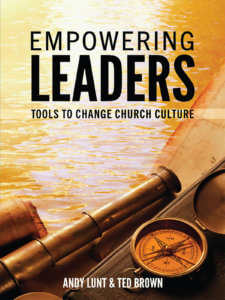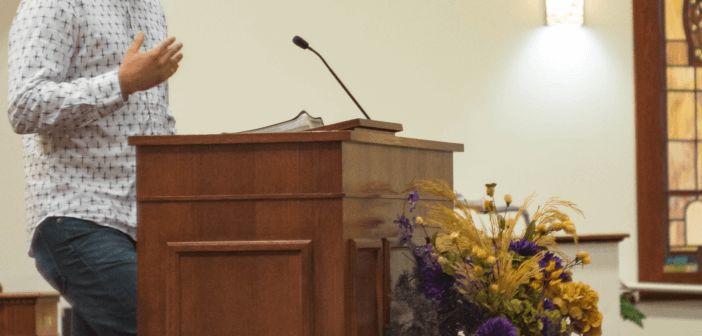Andy Lunt and Ted Brown say a commitment to lay empowerment must include allowing gifted laity central roles in worship, including preaching and offering prayers. Congregations that regard worship as the exclusive domain of clergy silence the powerful witness of laity that could do so much to transform the church and the world.
Worship is often neglected as an opportunity for lay ministry. It is often the last bastion of clergy privilege, power, and control. Of course, laity are expected to serve as ushers, sing in choirs, or perhaps even lead a few responses or read scripture. But the more central parts of worship are usually reserved for clergy.
In many churches the chancel rail (where those still exist) has been a boundary or barrier to the ministry of the laity. Inside the rail is the pastor’s domain; outside is the territory where lay ministry occurs. One of the marks of lay empowerment is greater presence and participation by laity “up front” on stage or inside the chancel area.
Having had the opportunity to worship in many different churches over several years, we can count on the fingers of one hand the number of times we witnessed laity open worship and extend a welcome or offer the pastoral prayer. And, of course, we don’t need any fingers on either hand to count the number of times we heard a member of the congregation deliver the sermon. And yet, we’re convinced that in many congregations, God has given these gifts to lay members of the faith community.
A powerful witness
Don’t get us wrong. We believe preaching is an important part of any pastor’s calling. But we know (and you do, too) that not all pastors are highly gifted preachers. In many congregations there are laity whose preaching gifts exceed those of the ordained pastor. Refusing to allow them to use their gifts — along with the preaching of the pastor — is a waste and a denial of God’s strategic plan for the church. At one time during Andy’s 31-year tenure, nearly 25 percent of the preaching was being done by gifted lay members — and no one complained, because it was good preaching!
This taps into the historical practice of witnessing, which has become something of a lost art in most congregations today. There is power in hearing the faith of someone like us expressed in a sermon or a prayer. We expect to hear from the pastor — and that is an important element in helping to grow disciples. But by silencing the voice of laity in our congregations we are losing a powerful witness that could do much more to transform the church and the world
Valuing participation as highly as professionalism
One of the more troublesome areas of tension that may arise early occurs when people begin to question whether “allowing” laity to engage in more public ministries will diminish the quality and excellence to which they’ve become accustomed. This stems, of course, from an unspoken assumption that quality and excellence come only from “professionals.”
But the idea is not sending just anyone in to pray, lead worship, or preach, but individuals who have been found to be gifted for these tasks. Further, there should be some level of training and practice before their first public engagement. Most congregations will discover the prayers and even sermons of gifted laity are more excellent than those of clergy who are not equally gifted in those areas.
There is always a learning curve for anyone engaging in something new. An individual’s first “pastoral prayer” may lack some of the polish of the pastor. In time, though, a truly gifted person will become more excellent in the practice of the ministry for which they have been given gifts. Nevertheless, the pastor who is leading a congregation in transforming the culture to one of greater lay empowerment will have to contend with questions of quality and will need to be committed to valuing participation at least as highly as professionalism. In such an environment intention, authenticity, and heart trump perfection
God did not discriminate when distributing gifts for things like caring, praying, and preaching. Anyone who obviously has a gift, whether clergy or lay, should be free to employ that gift in ministry and mission.
 Excerpted from Empowering Leaders: Tools to Change Church Culture (Lucid Books, 2023) by Andy Lunt and Ted Brown. Used by permission. The book is available at Cokesbury and Amazon.
Excerpted from Empowering Leaders: Tools to Change Church Culture (Lucid Books, 2023) by Andy Lunt and Ted Brown. Used by permission. The book is available at Cokesbury and Amazon.
Related Resources
- The Stone Soup Recipe for Vital Small Church Worship by Teresa Stewart
- Toward a Compelling Theology of Lay Ministry by Ann A. Michel
- Affirming the Ministry of Lay Readers by Theodore May






